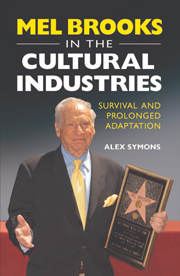Book contents
- Frontmatter
- Contents
- Acknowledgements
- Introduction
- 1 Rethinking Adaptation Studies: Survival Strategies in the Cultural Industries
- 2 From Sitcoms to ‘Parody-coms’: Writing for American TV, 1949–89
- 3 Prolonged Stardom: Audio Records, TV and Film, 1961–2004
- 4 Recycled Hollywood for the TV Generation: The Rise of Parody and the Fall of Mel Brooks the Director, 1974–95
- 5 The Integration of the Film and Theatre Industries: The Producers, 1968–2007
- Conclusion
- Bibliography
- Index
1 - Rethinking Adaptation Studies: Survival Strategies in the Cultural Industries
Published online by Cambridge University Press: 05 August 2013
- Frontmatter
- Contents
- Acknowledgements
- Introduction
- 1 Rethinking Adaptation Studies: Survival Strategies in the Cultural Industries
- 2 From Sitcoms to ‘Parody-coms’: Writing for American TV, 1949–89
- 3 Prolonged Stardom: Audio Records, TV and Film, 1961–2004
- 4 Recycled Hollywood for the TV Generation: The Rise of Parody and the Fall of Mel Brooks the Director, 1974–95
- 5 The Integration of the Film and Theatre Industries: The Producers, 1968–2007
- Conclusion
- Bibliography
- Index
Summary
Recent studies have identified the increasing prevalence of adaptations in modern entertainment, especially in film, television and theatre. However, the modern surge towards this current ‘adaptation culture’ – described by James Naremore in his introduction to his book Film Adaptation (2000) as a ‘media saturated environment dense with cross-references and filled with borrowings” – is not yet thoroughly understood. It is my suggestion that by rethinking adaptation from a new perspective, that of the ‘cultural industries’, as described by David Hesmondhalgh and others, the modern increased production of adaptations can be, in part, explained. According to these studies, since the late 1980s, artists and companies have increasingly adopted strategies of adaptations of various kinds in order to maximise their chances of survival in a competitive and unpredictable marketplace. Furthermore, there is convincing evidence to suggest that developments in industrialisation have accelerated the production of adaptations between different media. This corporate drive towards multimedia franchises has fostered the increased production of adaptations, culminating in what Henry Jenkins has described as the ‘convergence culture’.
In this historical-industrial context, the study of adaptations presents a useful new opportunity for rethinking the development of production trends, in particular, for examining exactly how this modern ‘convergence culture’ came about. As I explain, by looking at existing adaptation case studies, including those by Thomas Leitch, Ina Rae Hark and others, it is evident that producing adaptations has historically allowed artists to capitalise on ‘presold’ content – following similar survival strategies to that of modern companies, albeit on a smaller scale.
- Type
- Chapter
- Information
- Mel Brooks in the Cultural IndustriesSurvival and Prolonged Adaptation, pp. 20 - 47Publisher: Edinburgh University PressPrint publication year: 2012



